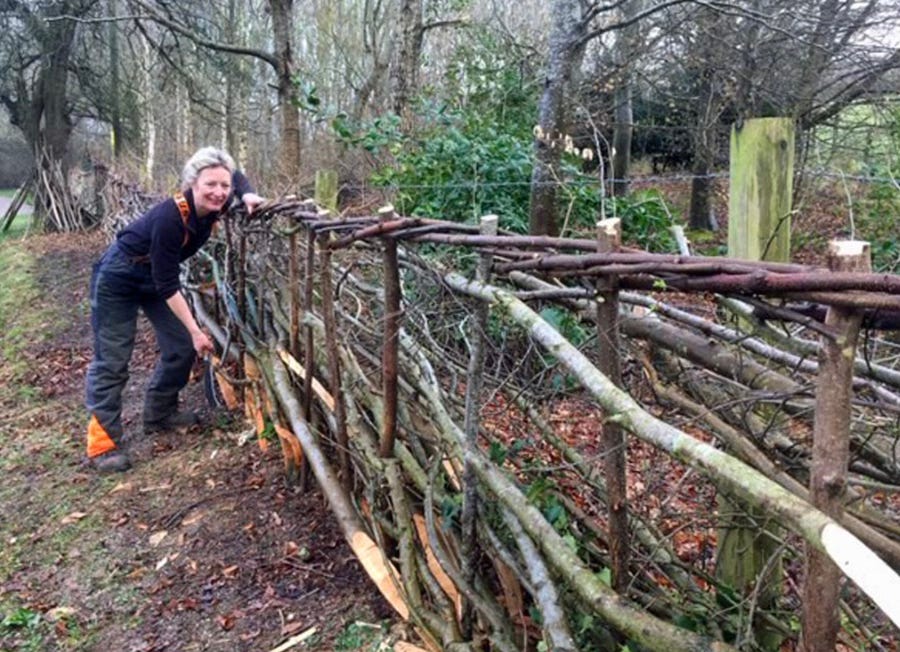A saving grace from the A.I. Tsunami?
Mass unemployment will probably create a drugged up, demoralized underclass. How about instead a resurgence of labour intensive, meaningful human care, ecological stewardship and craft work?
It’s early Saturday morning.
is worried about the accelerating pace of AI, the emergence of fully reasoning platforms and the likely destabilising job losses. It is a great article. He, like me, is trying to guide the kids with respect to very expensive higher education and degrees — which involves making impossible guesses about what long standing occupations and professions will be left standing by the gale of creative destruction.First the tsunami of job losses is a ‘when’ not an ‘if’. It has started — my mate works for a large manufacturing corporation which has just laid off 60 accountants in favour of a piece of ‘intelligent’ software. Who would have guessed that the safest of all professions would go the way of Blockbusters. As this snowball starts rolling, there is going to be political pressure for some kind of basic income. There are left and right wing arguments both for and against. I have been a cautious advocate for two decades. Most conservatives hate the prospect — but that is because they don’t really understand it. Abolishing all means-tested benefits in favour of a small, less-than-subsistence universal income would save billions on welfare bureaucracy, because it doesn’t require officious, underpaid clerics to police the line and make judgements about who is or is not worthy, respectable, legitimate or deserving of public largesse. If all tax allowances are abolished at the same time, the change would be revenue neutral — more like a negative income tax: i.e. the payment of tax allowances up front and in advance. At a stroke it would incentivize everyone to be involved in the labour market, or in the making and selling of goods or services — if only to top up their income. Creating a universal but very stingy safety net would promote enterpreneurship and risk taking throughout society. A guaranteed income operating over the whole life-course would allow people to cooperate, save, plan and invest in family-life, education, businesses with much less uncertainty.
Perhaps the greatest immediate impact would be the overnight elimination of the poverty trap. Every hour worked, every good or service sold would increase an individual’s net income. This is not true with any means tested welfare-safety net, which withdraws entitlement penny for penny, as income is earned. In a way, the issue is moot. Soon we won’t be able to afford the traditional welfare state. Dismantling the poverty trap would be an enormous step forward. A large part of the culture of dependency that plagues poor white and black populations in America and Britain is at least in part, a function of the fact that declaring even minimal ad hoc income immediately leads to a loss of welfare entitlements — and often a complete stop of payments until the unwieldy and officious bureaucracy catches up. If you grow up in this system, and everyone you know is ‘on welfare’, it’s hard to avoid the combination of enforced idleness and criminal activity in the informal economy (drugs, prostitution, thieving etc). The welfare system neatly enforces a cultural and aspirational chasm between ‘respectable’ working class and an undeserving underclass. Dismantling this system in favour of dignity, self-worth and family responsibility should surely be a libertarian /conservative dream ticket.
So a small, below subsistence, guaranteed basic income COULD be a good thing. But with the legalization of drugs (as in Canada), the normalization of ‘mercy’ killing of unproductive citizens (MAID), ubiquitous pornography and every more immersive VR entertainment — there will be a real political temptation to facilitate and even promote a trajectory where a large minority, or even majority, of people simply drop out and exist. This would be a dystopian version of Aaron Bastani’s ‘fully automated luxury communism’ — which was always a stupid idea (that’s where AI allows for a generous full wage for people to do absolutely nothing with their lives). This will be a very unsustainable option — because any kind of political stability will depend on a never ending flow of ‘stuff’, not least ever expanding servers, computer durables etc.
Second – there is also a sustainability opportunity, which should appeal to both greens and conservatives. I have riffed on this before, here.
The A.I shitstorm will make redundant a gargantuan amount of human labour. For the first time since WW1 — when Europe lost that whole generation of young men — there WILL be people to do all that stuff in society that simply can’t or shouldn’t be done by machines; the functions that we lost or which became degraded as labour became more expensive. Modernity is inhuman partly because it degrades, devalues and often eliminates this kind of work. Most obviously this pertains to all the caring, nurturing roles — motherhood, fathering, looking after the growing number of old people, disabled, hospitalized, lonely etc.
That would be great in itself. But from a sustainability point of view there are other possible gains. Householding, homeschooling, cooking, husbanding resources, repairing, self-provisioning, rearing backyard chickens, growing vegetables — all these functions that used to be part of the household economy and domestic livelihood, could come back into vogue by necessity but also through virtuous rediscovery. Where it survives at all, modern marriage has become empty of meaning and content because we have sub-contracted core components of family life to the state and to the market.
The same is true of our wider ‘oikos.’ A surfeit of labour might help us re-gain high yield, ecologically diverse, beautiful agriculture and rural landscapes, with agroforestry; small rotational mixed, family farms; and the kind of practices highlighted by that Rewilding documentary (the farm in Sussex where pigs go swimming and the storks came back).
In the UK I’m particularly thinking about hedges. After 70-90 years, hedges need relaying completely. All over the UK, that cycle of work broke down in the 1920s. The entire rural patchwork quilt tapestry that has defined English identity in particular, is unravelling. So yes — our hedgerows need saving and rebuilding. But by re-inhabiting our pastoral landscape we could do so much more: think re-wilded streams; beaver reintroductions; the growing of reed-beds for thatch; the use of horses in agriculture again. The bottom line is that more labour, more families, more people paying attention to a greater range of productive activities, more densely imbricated across smaller spaces, engendering more messy ‘edges’ — all make for a more granular landscapes (or ‘taskscapes’) with more surface area for a greater variety of both social and ecological diversity. In a pastoral landscape, more people, and more diverse human activity can create more ecological diversity, more species, a greater number of distinct ecosystems — and more beauty….to be appreciated and internalized as part of the identity and substance of those same people.
In a pastoral landscape, more people, and more diverse human activity can create more ecological diversity, more species, a greater number of distinct ecosystems — and more beauty….to be appreciated and internalized as part of the identity and substance of those same people.
This second trajectory is also the key to the other central problem of sustainability which pertains to meaning and ‘enchantment’. The modernist approach to sustainability is always about the ‘means’ — ‘how can we live in the same way as we do now, but sustainably’. It has been very unsuccessful at changing the ‘ends’ of social life. But a large scale return to ‘labours of love’ — love for friends, nieghbours, ….the caring/nurturing piece….but also love of our environment….and the kind of craft based joy of doing what humans have been designed to do by evolution….collaborative, creative craft activity….. then, there is a good chance that we really can move away from consumerism and materialism, and along the way, perhaps accidentally, radically reduce per capita metabolic footprints
I was reading ages ago about the discovery of thousands of perfectly knapped stone age tools from the upper palaeolithic — of a kind that were perfectly symmetrical and beautiful, but oddly – they showed — were NOT the most useful for doing any particular job; they were beautiful AND STILL SHARP. Which is to say they had never been used. The authors speculated that those who made these implements simply enjoyed doing this incredibly skillful craft for its own sake; making something beautiful who knows for what reason — just not utilitarian.
Anyway, sorry for long aside. If this second trajectory is to happen, it will require a very particular kind of nudging of the incentives: fiscal arrangements, welfare entitlements and regulatory structures. Perhaps even more so, it would require an imaginative political visioning of the opportunity. The prospect of bringing rightly-ordered creative, collaborative work back into the centre of our lives lived together is a prospect that is so far removed from modern life that it is just unavailable to most people. We have lost the ability to imagine a world like this. And yet when presented with an image of it, there is often an intuitive flash of recognition. This is what Christopher Alexander was attempting to articulate and bring to the surface in relation to architecture with his work on ‘pattern languages’ (here, and here). Though not in the foreground, Alexander’s Catholicism tapped into the traditional Christian understanding of the ‘good, the true and the beautiful’.
Anyway, modernity has effected a total corrosive assault on the good the true and the beautiful. In many ways it is an attack on the art of living together, joyfully and with grace. Last week I referred to the trajectory of re-enchantment intimated variously by Alexander, by Thomas Aquinas, by
‘s Open Source Ecology, by Michael Mehaff and by writers such as and James Rebank.Once seen and understood, this vision of an alternative to modernity is impossible to ‘unsee.’ But for most people, is in a part of the state space that my complexity colleagues call ‘the adjacent possible’ — which is to say, a set of possibilities that are right here, right now, right next to where we are, but invisible because of the way in which we represent and construct the world. To get through the wardrobe, you have first to have a mind that is open to another way of seeing. Changing that adjacent possible into something visible and compelling, might be the most radical and transformative thing we could do.
Just a thought
I have sheep to feed and then a wedding to attend







The other comment I will make is that what you describe as "beauty" and "worthwhile" are subjective. Beauty is in the eye of the beholder and you have a right to want and promote what you like. Personally, I like cityscapes, spreadsheets, and working in front of a computer (which is why I'm here in the first place) and the idea of an "idyllic" country life one in which "Householding, homeschooling, cooking, husbanding resources, repairing, self-provisioning, rearing backyard chickens, growing vegetables...could come back into vogue" fills me with a sense of horror.
I'm also an introvert so putting aside what "rightly-ordered" means, not all of use relish the thought of "collaborative work" being the center of our lives.
There doesn't seem to be a lot of room for other viewpoints in your dream world.
In paragraph 2 you state that people will be able to increase their net income by doing extra work, but in paragraph 1 you refer to a “tsunami of job loses” and in paragraph 5 (6?) you state “The A.I shitstorm will make redundant a gargantuan amount of human labour. For the first time since WW1 — when Europe lost that whole generation of young men — there WILL be people to do all that stuff in society that simply can’t or shouldn’t be done by machines.” Can you provide some examples of the jobs that AI and machines won’t be doing that will enable people to increase their net income?